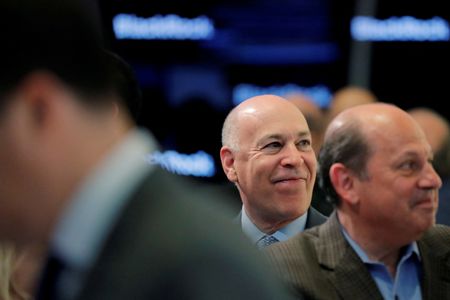By Davide Barbuscia
NEW YORK (Reuters) – BlackRock’s iShares exchange traded funds (ETFs) gained more net flows than Vanguard’s ETFs last year, according to estimates from industry tracker Morningstar, putting the world’s biggest asset manager in the lead for the first time since 2019.
BlackRock and Vanguard are the world’s two biggest asset managers as well as the largest providers of ETFs – products often targeted at retail investors as a cheap way to invest in the world’s biggest markets.
Total estimated net flows into ETFs globally amounted to about $745 billion last year, down from $1.2 trillion in 2021, when COVID-19 stimulus measures pushed retail investors to pile their growing cash balances into such products. Net flows into U.S.-domiciled ETFs have also come down year on year, according to Morningstar data, to about $590 billion last year from $911 billion in 2021.
Despite the yearly declines, net flows into ETFs, both globally and in the United States, were the second-highest ever last year, with BlackRock’s iShares regaining the top position.
Estimated net flows into BlackRock’s global iShares ETFs amounted to about $220 billion last year against nearly $214 billion in estimated net flows into Vanguard’s ETFs, according to Morningstar data. Net flows into Vanguard’s ETFs had been higher in the prior two years.
Graphic: BlackRock and Vanguard ETF flows https://www.reuters.com/graphics/BLACKROCK-ETF/klvygzgoevg/chart.png
“Despite significant headwinds across all major asset classes, Vanguard funds experienced strong net cash inflows in 2022,” a Vanguard spokesperson said. “For many investors, ETFs remained the vehicle of choice for low-cost, broadly diversified exposure to the stock and bond markets.”
Salim Ramji, global head of iShares and Index Investments, said iShares global bond ETFs saw a record of $123 billion in flows last year, up from $80 billion in 2021, despite fixed income markets experiencing one of the worst years in decades.
Inflows into iShares’ fixed income ETFs increased in the second half of the year, after the Federal Reserve accelerated the pace of its monetary tightening actions with super-sized interest rate hikes that weighed heavily on bond prices, boosting yields.
In the fourth quarter, flows into bond ETFs had a “much more risk on tone within asset class flows,” Ramji said, with investors adding more exposure to longer-term maturities for U.S. Treasuries as investors anticipated a slowdown in rate hikes by the U.S. central bank, as well as adding to corporate bond funds for the first time all year.
BlackRock’s president, Robert Kapito, said in October last year during the company’s third-quarter conference call that he expected “dramatic and large inflows” into fixed income in 2023 due to higher interest rates.
BlackRock will report fourth-quarter 2022 earnings on Friday.
(Reporting by Davide Barbuscia in New York; Editing by Matthew Lewis)

